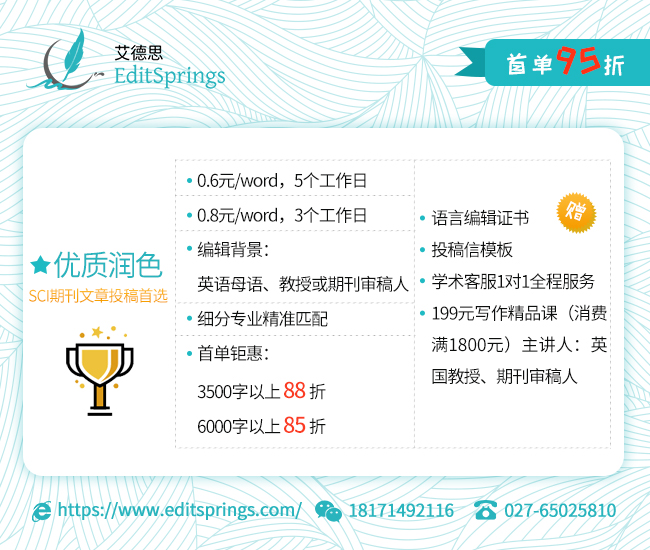来自美国波士顿

微信扫码关注公众号进行登录


完善安全信息
为了您的账号安全,请完善以下信息


来自美国波士顿
更专业的论文润色机构
微信扫码登录
微信扫码关注公众号进行登录


来自美国波士顿
更专业的论文润色机构
手机验证码登录
账号密码登录
微信扫码登录
微信扫码关注公众号进行登录
期刊动态国际学术期刊EastAsianPragmatics,EditSprings,艾德思

这个寒冷的季节 因您的关注 而变得温暖
East Asian Pragmatics
各位专家/同仁,好消息!由中国逻辑学会语用学专业委员会(CPrA)会长/南京大学陈新仁教授与匈牙利科学院Daniel Z. Kádár教授联合创办并共同担任主编的国际学术期刊——East Asian Pragmatics(EAP)(<东亚语用学>)目前已正式被SCOPUS收录.本刊由英国Equinox Publishing Ltd编辑/出版,纸质版刊号是ISSN 2055-7752,网络版刊号是ISSN 2055-7760,于每年5月/11月出版,本刊目前已进入 ERIH PLUS/ MLA International Bibliography/SCOPUS (from 2018) 多 家检索系统.
感谢大家长期的支持和关爱,欢迎引用本刊并惠赐稿件!我们将继续努力,办一份既属于中国又属于世界的优秀刊物,早日进入Ssci和A&HCI,为大家创造和保持一个良好的国际学术交流平台!
本期主要介绍2018年第3卷第2期的目录及摘要.
期刊宗旨
East Asian Pragmatics的创刊宗旨是增进对亚洲文化背景下语言使用与人际互动的理解,既关注宏观的国家层面的文化,又关注诸如民族地区/实践社区/关系网络等地方性文化.同时,通过聚焦来自东亚国家或地区的语用语料,对语用学学科的理论建构做出贡献.该刊期望能为东亚语用学研究者与西方研究者的学术交流搭建一个合适的沟通平台.为此,该刊约请了一批来自东西方语用学学界的知名学者担任编委.特别是,国际语用学协会秘书长/比利时安特卫普大学Jef Verschueren教授和美国夏威夷大学Haruko Cook教授担任本刊的顾问编辑.
编委会
Editorial Board
Editors
Xinren Chen, Nanjing University, China
Dániel Z Kádár, Hungarian Academy of Sciences
Advisory Editors
Haruko Cook, University of Hawai'i at Manoa, United States
Jef Verschueren, University of Antwerp, Belgium
Reviews Editor
Yasuko Obana, Kwansei Gakuin University, Japan
Editorial Board
Rong Chen, California State University, San Bernardino, United States
Yuanshan Chen, National Chin-Yi University of Technology, NCUT, Taiwan
Winnie Cheng, Hong Kong Polytechnic University, Hong Kong
Yueguo Gu, Chinese Academy of Social Sciences, China
Ziran He, Guangdong University of Foreign Studies, China
Michael Haugh, University of Queensland, Australia
Takuo Hayashi, Momoyama Gakuin University, Japan
Gang He, East China Normal University, China
Agnes Weiyun He, Stony Brook University, United States
Patrick Heinrich, Ca'Foscari University, Venice, Italy
Sachiko Ide, Japan Women's University, Japan
Istvan Kecskes, State University of New York, United States
Alan Hyun-Oak Kim, University of Illinois at Carbondale, United States
Jong-Hyun Kim, Cheongju National University of Education, Republic of Korea
Sungborn Lee, Sogang University, Republic of Korea
Cher Leng Lee, National University of Singapore, Singapore
Renia Lopez, Hong Kong Polytechnic University, Hong Kong
LuMing Mao, Miami University, United States
Yoshiko Matsumoto, Stanford University, United States
Jun Ohashi, University of Melbourne, Australia
Jim O'Driscoll, University of Huddersfield, United Kingdom
Shigeko Okamoto, University of California Santa Cruz, United States
Yuling Pan, US Census Bureau, United States
Barbara Pizziconi, SOAS, United Kingdom
Yongping Ran, Guangdong University of Foreign Studies, China
Victoria Rau, National Chung Cheng University, Taiwan
Wei Ren, Guangdong University of Foreign Studies, China
Helen Spencer-Oatey, University of Warwick, United Kingdom
Zhang Wei, City University of Hong Kong, Hong Kong
Olga Zayts, The University of Hong Kong, Hong Kong
Doreen D. Wu, Hong Kong Polytechnic University, Hong Kong
★ 2018年第3卷第2期目录及摘要 ★
01
Did Becky really need to apologise? Intercultural evaluations of politeness
Emi Okano, Lucien Brown
Issued Date: 31 Aug 2018
Abstract:
This study analyses a public apology made in 2016 by Becky, an Anglo-Japanese tarento 'celebrity', for her romantic involvement with a married man, musician Enon Kawatani. Adopting an integrative pragmatics perspective, we analyse the pragmatic acts Becky used to perform her apology, including culture-specific nonverbal behaviours indexing deference. We then look at how the apology was dynamically evaluated in naturally occurring discourse in Japanese and British Computer Mediated Communication (CMC). The analysis shows that culture-specific moral orders rendered Becky's apology necessary in the Japanese context, but that these norms were not shared by the British audience. The Japanese and British CMC participants utilised national identity as resources for negotiating their contrasting moral orders. We show how CMC participants assign significance to the (im)politeness-related behaviour to which they were exposed and how they performed (im)politeness through threatening national identities.
02
A cross-cultural analysis of celebrity practice in microblogging
Min Zhang, Doreen D. Wu
Issued Date: 31 Aug 2018
Abstract
This study attempts to explore how celebrities manage rapport with followers through an array of speech acts in microblogging - the essential building blocks of virtual identity on social media. Six months of postings of eight of the most-followed Twitter and Weibo celebrities from USA and China were retrieved and analysed. A taxonomy of nine speech acts for rapport management was identified to give a categorised descriptive snapshot of celebrities' microblogging discourse.The results revealed that the celebrities from both countries employ self-disclosing speech acts extensively to report events, anecdotes, or initiate small talk with fans for solidarity building. In addition, the attention fostered by the personalised, affective, and eye-catching self-disclosure posts is frequently directed to the posts promoting their professional activities or products to commercialise the solidarity as much needed for maintaining a strong fan base. In general, the celebrity practices in USA and China display a converging trend as the prevalent speech acts are largely overlapping across cultures, while culture-specific microblogging behaviours were also identified from the less frequently performed speech acts.
03
Malefactive uses of giving/receiving expressions: The case of te-kureru in Japanese
Yasuko Obana, Michael Haugh
Issued Date: 31 Aug 2018
Abstract:
The Japanese auxiliary te-kureru ('giving to the speaker or the speaker's group member') is traditionally assumed to connote gratitude, favour or 'politeness', and thus is regarded as a benefactive. In this paper we argue that te-kureru does not inherently indicate benefaction, but rather that its occurrence, whether it is grammatically obligatory or optional, serves to intensify the speaker's affective stance towards the referent in that given context. This accounts for the way in which this auxiliary may also contribute to expressions of sarcasm, anger, contempt or retaliation. We propose that because malefaction is unfavourable to the speaker, the speaker deliberately takes a lower stance through te-kureru, making as if the other's unfavourable action was taken from a higher position, which amounts to a putting down or deliberate neglect of the speaker. We also suggest that the auxiliary remains affectively neutral if the context is neither benefactive nor malefactive in orientation.
04
Frames and interaction on the air
Hao Sun
Issued Date: 31 Aug 2018
Abstract:
Drawing on frames theory as an analytical framework, this study examines discourse interaction of a radio phone-in program in Shanghai, during which professionals specialized in psychology or a related field provide advice to audience callers by answering questions and addressing concerns on the phone. It aims to describe and analyze what frames are constructed, and how these frames are linguistically and discursively accomplished at a local level in institutional settings. Identifying three major frames (Host, Professional and Community), the author demonstrates how participants create, shift and blend frames in response to contingency of the local discoursive and interactional context. This study also underlines the benefits of incorporating multiple persepctives in examination of discoursive intearction.
05
The acceptability of American politeness from a native and non-native comparative perspective
Yi Sun
Issued Date: 11 Sep 2018
Abstract:
This article examines the American politeness phenomena from a comparative perspective between American native speakers and intermediate- or high-level second language learners in mainland China. Both groups are invited to inspect the same ten conversations randomly elicited from the Oral Corpus of California University at San Barbara and evaluate the politeness acceptability in terms of a questionnaire. In that questionnaire, Likert scaling as a bipolar scaling method, also called summative scales, measures either positive or negative responses to a conversation in judging whether it is polite or not. With the assistance of statistical software SPSS 21, it continues to discuss the discrepant understanding of the groups towards the same politeness phenomena. It is found that all the Chinese subjects, though already intermediate- or high-level English learners for at least ten years, are somewhat weak in evaluating American politeness. There is an apparent blocking 'plateau' in their accurately interpreting politeness in naturally occurring American English conversations. The article then conducts a closed follow-up structured review to discuss why Chinese interviewees exhibit strikingly low scores in the questionnaire comparatively so as to complement the quantitative results of politeness judgment with an in-depth qualitative exploration. The main focus was in revealing the panoramic status of second-language learners' politeness acceptability, their underlying explanatory motivations, as well as possible implications for pragmatic teaching.
投稿及订阅方法
本刊欢迎下列投稿: 关于语用学传统话题(如言语行为/预设/指示语/含意等)的研究;关于指称/称呼/(不)礼貌/身份建构/语用使用中的规约/程式/幽默等的研究 .本刊特别欢迎基于自然发生的语料的语用学研究成果/不仅对本学科而且对相邻学科有启发的研究成果.
本刊接受的来稿类型包括:
1)英语撰写的原创性研究文章,字数不超过10,000词;
2)英语撰写的书评,字数在2,000 词左右.
也可以接受专题性系列文章(即专辑,special issue),但专辑组织者需要与主编事先取得联系.
East Asian Pragmatics只接受网络在线投稿,该系统的网页地址是:
订阅方法
Subscriptions Contact
Yvonne Nazareth Subscription Customer Services Manager, Equinox Publishing Ltd, Office 415, The Workstation, 15 Paternoster Row, Sheffield, S1 2BX, U.K. Phone: +44 (0)114 221 0285 Fax: +44 (0)114 279 6522 Email: ynazareth@equinoxpub.com
NEW OR RENEWAL SUBSCRIPTION TO EAST ASIAN PRAGMATICS
For Individual subscriptions please click:
For Institutional* subscriptions please click:
Price
欢迎您订阅 East Asian Pragmatics !CPrA会员尊享优惠价,EAP第一期现可免费全文下载.下载地址(点击阅读全文,查看详情):
编者按
感谢陈新仁教授的支持
本文编辑:语言学通讯特约编辑 上海理工大学 孙雨
欢迎投稿/订阅 East Asian Pragmatics .
公众号外联: 我们优先推广免费的学术会议/研修等项目.收费项目与商务合作需支持劳务费,请联系 dianzishu@ 商谈 .
语言学通讯将继续为大家提供更多学术信息,欢迎赞赏我们
赞赏语言学通讯
语言学通讯外文书店
科研助力|"语言·文学·文化研究系列丛书'征稿函
科研助力|"语言学通讯博士论丛'书稿征集
专著推荐|邹崇理:<自然语言信息处理的逻辑语义学研究>
专著推荐|吴琳:动补式复合词的词法理论与应用研究
专著推荐|管新潮<语料库与Python应用>
专著推荐|龚晓睿:威•休•奥登诗歌中的绘画艺术研究
专著推荐|杨小虎:非语言因素对外语语音学习的影响研究
专著推荐|语音感知视角下的英文外国口音研究
专著推荐| 认知语言学
专著推荐| 语料库翻译学系列读本
专著推荐|胡开宝团队<语料库批评翻译学概论>
专著推荐|赵彦春<英韵三字经>
专著推荐|冷冰冰:<科普杂志翻译规范研究>
专著推荐|修辞问句与关联理论 ——基于语料库的修辞问句在独白式文本中语用研究
专著推荐|黄忠廉<人文社科项目申报300问>
专著推荐|张艺琼:网络科学新闻的多模态语篇研究——共时和历时视角
更多科研论文服务,动动手指,请戳 论文润色、投稿期刊推荐、论文翻译润色、论文指导及修改、论文预审!
语言不过关被拒?美国EditSprings--专业英语论文润色翻译修改服务专家帮您!


特别声明:本文转载仅仅是出于传播信息的需要,并不意味着代表本网站观点或证实其内容的真实性;如其他媒体、网站或个人从本网站转载使用,须保留本网站注明的“来源”,并自负版权等法律责任;作者如果不希望被转载或者联系转载稿费等事宜,请与我们接洽。
凡注明来源为“EditSprings”的论文,如需转载,请注明来源EditSprings并附上论文链接。













 鄂公网安备:
鄂公网安备: